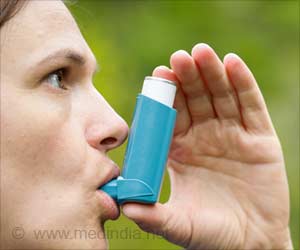“Anyone with asthma should continue to work with their healthcare provider to ensure they are getting the best treatment for their asthma, which leads to better asthma control and decreases the likelihood of severe COVID-19 outcomes,” said co-first author Zhanghua Chen, an assistant professor of population and public health sciences at the Keck School of Medicine of USC.
‘COVID-19 outcomes might change for asthma patients depending on their level of asthma control.’
Approximately 25 million Americans including 8 percent of adults and 7 percent of children have asthma, a potentially serious underlying condition in the face of widespread COVID transmission.
Researchers evaluated the impact of breathing disorders on COVID outcomes in a population with equal access to health care using data on 61,338 COVID-19 patients from Kaiser Permanente Southern California from March 1 to August 31, 2020.
Medical codes were used to determine if these patients had asthma or chronic obstructive pulmonary disease (COPD) prior to their COVID-19 diagnosis.
Later, they separated data into the “active” group accounting for any patients who’d had a clinical visit for asthma within the last 12 months, and the “inactive” group accounting for those who had not.
A total of 2,751 patients were in the inactive asthma group versus 2,775 in the active asthma group. Additionally, 820 patients had a history of COPD.
Patients in the active asthma group had higher chances of hospitalization, a need for intensive respiratory support (IRS), and ICU admission within 30 days of COVID-19 diagnosis compared to those with inactive asthma, or no history of asthma or COPD.
This study also demonstrated that even in patients with active asthma, using medications can decrease the worsened COVID-19 outcomes.
Source: Medindia



